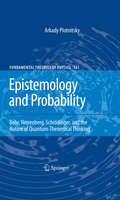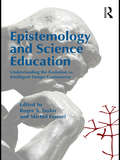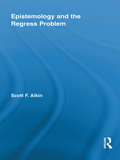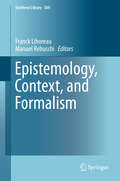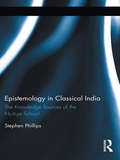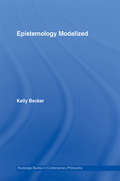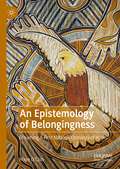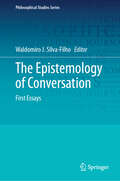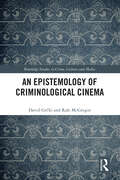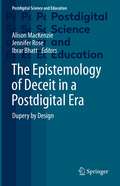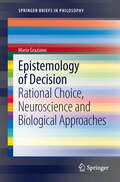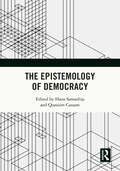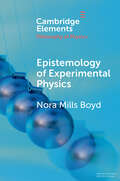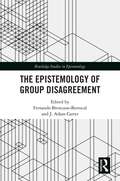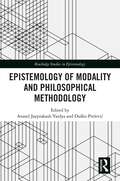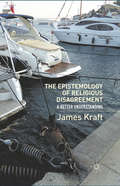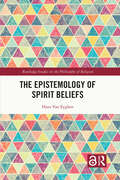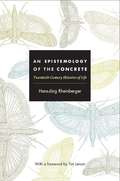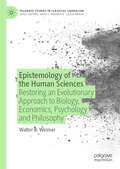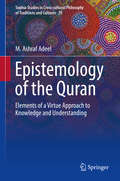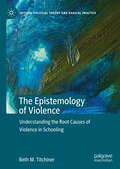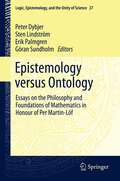- Table View
- List View
Epistemology and Probability
by Arkady PlotnitskyThe book offers an exploration of the relationships between epistemology and probability in the work of Niels Bohr, Werner Heisenberg, and Erwin Schrödinger; in quantum mechanics; and in modern physics as a whole. It also considers the implications of these relationships and of quantum theory itself for our understanding of the nature of thinking and knowledge in general. These implications are radical and controversial. While they have been seen as scientifically productive and intellectually liberating to some, Bohr and Heisenberg among them, they have been troublesome to many others, beginning with Schrödinger and, most famously, Einstein, who refused to believe that God would resort to playing dice, as quantum theory appeared to demand. The situation led to an intense debate, in particular the great confrontation between Einstein and Bohr, which began around the time of the discovery of quantum mechanics by Heisenberg and Schrödinger in 1920s and has overshadowed the history of the debate concerning quantum mechanics ever since. The controversy itself surrounding quantum theory and the intensity of the debate concerning it have remained undiminished. No end appears to be in sight. At the same time, in spite of the enormous and ever proliferating amount of commentaries in all genres (technical, philosophical, and popular), some of the deeper philosophical aspects of quantum mechanics and of the philosophical thought of the figures considered in this study often remain explored. The main aim of this book is to contribute to a better understanding of the nature of quantum-theoretical thinking and of the reasons for this extraordinary impact and controversy. Philosophically, the book pursues this task by bringing together in a new way the relationships between epistemology and probability in quantum theory and beyond. Historically, it does so by engaging comprehensively and in a mutually illuminating way with the work of all three key figures responsible for the birth of quantum mechanics - Heisenberg, Schrödinger, and, as concerns quantum epistemology, Bohr - which has not be previously done in literature on quantum mechanics. Among other key contributions of the book is an analysis of the role of mathematics in quantum theory and in the thinking of Bohr, Heisenberg, and Schrödinger; a new treatment of the famous experiment of Einstein, Podolsky, and Rosen (EPR) and of the Bohr-Einstein exchange concerning it; and an exploration of the implications of the epistemological problematics considered by the book for new developments of quantum mechanics itself, such as quantum information theory, on the one hand, and, on the other, for higher-level physical theories, from quantum field theory to string/brane theories and new cosmological theories.
Epistemology and Science Education: Understanding the Evolution vs. Intelligent Design Controversy
by Roger S. Taylor Michel FerrariHow is epistemology related to the issue of teaching science and evolution in the schools? Addressing a flashpoint issue in our schools today, this book explores core epistemological differences between proponents of intelligent design and evolutionary scientists, as well as the critical role of epistemological beliefs in learning science. Preeminent scholars in these areas report empirical research and/or make a theoretical contribution, with a particular emphasis on the controversy over whether intelligent design deserves to be considered a science alongside Darwinian evolution. This pioneering book coordinates and provides a complete picture of the intersections in the study of evolution, epistemology, and science education, in order to allow a deeper understanding of the intelligent design vs. evolution controversy. This is a very timely book for teachers and policy makers who are wrestling with issues of how to teach biology and evolution within a cultural context in which intelligent design has been and is likely to remain a challenge for the foreseeable future.
Epistemology and the Regress Problem (Routledge Studies in Contemporary Philosophy)
by Scott AikinIn the last decade, the familiar problem of the regress of reasons has returned to prominent consideration in epistemology. And with the return of the problem, evaluation of the options available for its solution is begun anew. Reason’s regress problem, roughly put, is that if one has good reasons to believe something, one must have good reason to hold those reasons are good. And for those reasons, one must have further reasons to hold they are good, and so a regress of reasons looms. In this new study, Aikin presents a full case for infinitism as a response to the problem of the regress of reasons. Infinitism is the view that one must have a non-terminating chain of reasons in order to be justified. The most defensible form of infinitism, he argues, is that of a mixed theory – that is, epistemic infinitism must be consistent with and integrate other solutions to the regress problem.
Epistemology, Context, and Formalism
by Franck Lihoreau Manuel RebuschiThe main purpose of the present volume is to advance our understanding of the notions of knowledge and context, the connections between them and the ways in which they can be modeled, in particular formalized - a question of prime importance and utmost relevance to such diverse disciplines as philosophy, linguistics, computer science and artificial intelligence and cognitive science. Bringing together essays written by world-leading experts and emerging researchers in epistemology, logic, philosophy of language, linguistics and theoretical computer science, the book examines the formal modeling of knowledge and the knowledge-context link at one or more of three intersections - context and epistemology, epistemology and formalism, formalism and context - and presents a novel range of approaches to the current discussions that the connections between knowledge, language, action, reasoning and context continually enlivens. It develops powerful ideas that will push the relevant fields forward and give a sense of the new directions in which mainstream and formal research on knowledge and context is heading.
Epistemology, Context, and Formalism (Synthese Library #369)
by Franck Lihoreau Manuel RebuschiThe main purpose of the present volume is to advance our understanding of the notions of knowledge and context, the connections between them and the ways in which they can be modeled, in particular formalized – a question of prime importance and utmost relevance to such diverse disciplines as philosophy, linguistics, computer science and artificial intelligence and cognitive science.Bringing together essays written by world-leading experts and emerging researchers in epistemology, logic, philosophy of language, linguistics and theoretical computer science, the book examines the formal modeling of knowledge and the knowledge-context link at one or more of three intersections - context and epistemology, epistemology and formalism, formalism and context – and presents a novel range of approaches to the current discussions that the connections between knowledge, language, action, reasoning and context continually enlivens. It develops powerful ideas that will push the relevant fields forward and give a sense of the new directions in which mainstream and formal research on knowledge and context is heading.
Epistemology in Classical India: The Knowledge Sources of the Nyaya School
by Stephen H PhillipsIn this book, Phillips gives an overview of the contribution of Nyaya--the classical Indian school that defends an externalist position about knowledge as well as an internalist position about justification. Nyaya literature extends almost two thousand years and comprises hundreds of texts, and in this book, Phillips presents a useful overview of the under-studied system of thought. For the philosopher rather than the scholar of Sanskrit, the book makes a whole range of Nyaya positions and arguments accessible to students of epistemology who are unfamiliar with classical Indian systems.
Epistemology Modalized (Routledge Studies in Contemporary Philosophy)
by Kelly BeckerThis book sets out first to explain how two fairly recent developments in philosophy, externalism and modalism, provide the basis for a promising account of knowledge, and then works through the different modalized epistemologies extant in the literature, assessing their strengths and weaknesses. Finally, the author proposes the theory that knowledge is reliably formed, sensitive true belief, and defends the theory against objections.
An Epistemology of Belongingness: Dreaming A First Nation’s Ontology of Hope
by Hope O'ChinThe intent of this book focuses on Australia’s First Nations truth, voice, recognition, diversity, and respect. Hope O’Chin explains that knowledge about Australian First Nations culture and learning can be seen through new conceptual lens, which she refers to as an Ontology of Dreaming Hope for Australians. The book proposes to move from ontological propositions embedded in pedagogies and methodologies that center on the relevance of Indigenous epistemes and ways of doing. O’Chin offers a conceptual framing for engaging with Indigenous peoples, and forming communities of belongingness and relationality. She offers suggestions for ways in which art and education can act as ‘healing’ and a way forward towards a more inclusive civil society. Reflexive practice, ethnographic principles, and action research is described in a way that methodologies provide an understanding of a sense of Belonging. O'Chin argues that theoretical research, art, and educational practice can addto the value of determining a strategy of Indigenous art investment within Australia, and to address how art and education can be used to validate contemporary expression of Aboriginality within contemporary Australian society. Ultimately, the book is about Indigenous strengths and what Indigenous ways of being, knowing and doing can offer, and how one might go about honouring and working in this way respectfully.
The Epistemology of Conversation: First Essays (Philosophical Studies Series #156)
by Waldomiro J. Silva-FilhoThis edited volume presents an innovative perspective on conversation and is the first book to deal with the epistemic aspects of conversation or dialogue. "Conversation" has been a recurring subject in various fields of philosophy, such as moral philosophy, pragmatics, and the philosophy of language. This text assumes conversation as a joint agency and explores when participants assume common purposes, commit to contributing relevant statements, and face the challenges of confronting interlocutors. It investigates whether the norm of conversation can be reduced to the interaction between speaker and audience, where the speaker must speak the truth and the audience must understand this intention. This volume explores the epistemology of testimony and addresses the motivations for starting a conversation, which can include legitimate disagreements, as well as curiosities about the interlocutor's beliefs and shared doubts. This text contributes to understanding epistemic dynamics in contemporary liberal democracies, such as polarization, disintegration of epistemic communities, silencing, and epistemic injustices. It appeals to students and researchers.
An Epistemology of Criminological Cinema (Routledge Studies in Crime, Culture and Media)
by David Grčki Rafe McGregorStanding at the intersection of criminology and philosophy, this book demonstrates the ways in which mythic movies and television series can provide an understanding of actual crimes and social harms.Taking three social problems as its subjects – capitalist political economy, structural injustice, and racism – the book explores the ways in which David Fincher’s Fight Club (1999), HBO’s Game of Thrones (2011–2019), and Jordan Peele’s Us (2019) offer solutions by reconceiving justice in terms of personal and collective transformation, utopian thinking, and the relationship between racism and elitism, respectively. In doing so, the authors set out a theory of understanding the world based on cinematic and televisual works of art and conclude with a template that establishes a methodology for future use.An Epistemology of Criminological Cinema is authoritative and accessible, ideal reading for undergraduate and postgraduate students, criminologists, philosophers, and film, television, and literary critics with an interest in social justice and social harm.
The Epistemology of Deceit in a Postdigital Era: Dupery by Design (Postdigital Science and Education)
by Jennifer Rose Ibrar Bhatt Alison MacKenzieThis edited book collection offers strong theoretical and philosophical insight into how digital platforms and their constituent algorithms interact with belief systems to achieve deception, and how related vices such as lies, bullshit, misinformation, disinformation, and ignorance contribute to deception. This inter-disciplinary collection explores how we can better understand and respond to these problematic practices. The Epistemology of Deceit in a Postdigital Era: Dupery by Design will be of interest to anyone concerned with deception in a ‘postdigital’ era including fake news, and propaganda online. The election of populist governments across the world has raised concerns that fake news in online platforms is undermining the legitimacy of the press, the democratic process, and the authority of sources such as science, the social sciences and qualified experts. The global reach of Google, YouTube, Twitter, Facebook, and other platforms has shown that they can be used to create and spread fake and misleading news quickly and without control. These platforms operate and thrive in an increasingly balkanised media eco-system where networks of users will predominantly access and consume information that conforms to their existing worldviews. Conflicting positions, even if relevant and authoritative, are suppressed, or overlooked in everyday digital information consumption. Digital platforms have contributed to the prolific spread of false information, enabled ignorance in online news consumers, and fostered confusion over determining fact from fiction. The collection explores: Deception, what it is, and how its proliferation is achieved in online platforms. Truth and the appearance of truth, and the role digital technologies play in pretending to represent truth. How we can counter these vices to protect ourselves and our institutions from their potentially baneful effects. Chapter 15 is available open access under a Creative Commons Attribution 4.0 International License via link.springer.com.
Epistemology of Decision
by Mario GrazianoThis book carries out an epistemological analysis of the decision, including a critical analysis through the continuous reference to an interdisciplinary approach including a synthesis of philosophical approaches, biology and neuroscience. Besides this it represents the analysis of causality here seen not from the formal point of view, but from the "embodied" point of view.
The Epistemology of Democracy
by Quassim CassamThis is the first edited scholarly collection devoted solely to the epistemology of democracy. Its 15 chapters, published here for the first time and written by an international team of leading researchers, will interest scholars and advanced students working in democratic theory, the harrowing crisis of democracy, political philosophy, social epistemology, and political epistemology. The volume is structured into three parts, each offering five chapters. The first part, Democratic Pessimism, covers the crisis of democracy, the rise of authoritarianism, public epistemic vices, misinformation and disinformation, civic ignorance, and the lacking quantitative case for democratic decision-making. The second part, Democratic Optimism, discusses the role of hope and positive emotions in rebuilding democracy, proposes solutions to myside bias, and criticizes dominant epistocratic approaches to forming political administrations. The third and final part, Democratic Realism, assesses whether we genuinely require emotional empathy to understand the perspectives of our political adversaries, discusses the democratic tension between mutual respect for others and a quest for social justice, and evaluates manifold top-down and bottom-up approaches to policy making.
Epistemology of Experimental Physics (Elements in the Philosophy of Physics)
by Nora Mills BoydThis Element introduces major issues in the epistemology of experimental physics through discussion of canonical physics experiments and some that have not yet received much philosophical attention. The primary challenge is to make sense of how physicists justify crucial decisions made in the course of empirical research. Judging a result as epistemically significant or as calling for further technical scrutiny of the equipment is one important context of such decisions. Judging whether the instrument has been calibrated, and which data should be included in the analysis are others. To what extent is it possible to offer philosophical analysis, systematization, and prescriptions regarding such decisions? To what extent can there be explicit epistemic justification for them? The primary aim of this Element is to show how a nuanced understanding of science in practice informs an epistemology of experimental physics that avoids strong social constructivism.
The Epistemology of Group Disagreement (Routledge Studies in Epistemology)
by Fernando Broncano-Berrocal J. Adam CarterThis book brings together philosophers to investigate the nature and normativity of group disagreement. Debates in the epistemology of disagreement have mainly been concerned with idealized cases of peer disagreement between individuals. However, most real-life disagreements are complex and often take place within and between groups. Ascribing views, beliefs, and judgments to groups is a common phenomenon that is well researched in the literature on the ontology and epistemology of groups. The chapters in this volume seek to connect these literatures and to explore both intra- and inter- group disagreements. They apply their discussions to a range of political, religious, social, and scientific issues. The Epistemology of Group Disagreement is an important resource for students and scholars working on social and applied epistemology; disagreement; and topics at the intersection of epistemology, ethics, and politics.
The Epistemology of Indicative Conditionals
by Igor DouvenConditionals are sentences of the form 'If A, then B', and they play a central role in scientific, logical, and everyday reasoning. They have been in the philosophical limelight for centuries, and more recently, they have been receiving attention from psychologists, linguists, and computer scientists. In spite of this, many key questions concerning conditionals remain unanswered. While most of the work on conditionals has addressed semantical questions - questions about the truth conditions of conditionals - this book focuses on the main epistemological questions that conditionals give rise to, such as: what are the probabilities of conditionals? When is a conditional acceptable or assertable? What do we learn when we receive new conditional information? In answering these questions, this book combines the formal tools of logic and probability theory with the experimental approach of cognitive psychology. It will be of interest to students and researchers in logic, epistemology, and psychology of reasoning.
Epistemology of Modality and Philosophical Methodology (Routledge Studies in Epistemology)
by Anand Jayprakash Vaidya Duško PrelevićThis book collects original essays on the epistemology of modality and related issues in modal metaphysics and philosophical methodology. The contributors utilize both the newer "metaphysics-first" and the more traditional "epistemology-first" approaches to these issues. The chapters on modal epistemology mostly focus on the problem of how we can gain knowledge of possibilities, which have never been actualized, or necessities which are not provable either by logico-mathematical reasoning or by linguistic competence alone. These issues are closely related to some of the central issues in philosophical methodology, notably: to what extent is the armchair methodology of philosophy a reliable guide for the formation of beliefs about what is possible and necessary. This question also relates to the nature of thought experiments that are extensively used in science and philosophy. Epistemology of Modality and Philosophical Methodology will be of interest to researchers and advanced students working on the epistemology and metaphysics of modality, as well as those whose work is concerned with philosophical methodology more generally.
The Epistemology of Religious Disagreement
by James KraftMany assume falsely that religious disagreements engage rules of evidence presentation and belief justification radically different than the ordinary disagreements people have every day, whether those religious disagreements are in Sri Lanka between Hindus and Buddhists or in the Middle East among Jews, Christians, and Muslims.
The Epistemology of Spirit Beliefs (Routledge Studies in the Philosophy of Religion)
by Hans Van EyghenThis book assesses whether belief in spirits is epistemically justified. It presents two arguments in support of the existence of spirits and arguments that experiences of various sorts (perceptions, mediumship, possession and animistic experiences) can lend justification to spirit-beliefs. Most work in philosophy of religion exclusively deals with the existence of God or the epistemic status of belief in God. Spirit beliefs are often regarded as aberrations, and the falsity of such beliefs is often assumed. This book argues that various beliefs concerning spirits can be regarded as justified when they are rooted in experiences that are not defeated. It argues that spirit-beliefs are not defeated by recent theories put forth by neuroscientists, cognitive scientists or evolutionary biologists. Additional arguments are made that traditional theistic belief is epistemically linked to spirit beliefs and that unusual events can be explained in terms of spirit-activity. The book draws on theistic arguments, phenomenal conservatism and defenses of religious experiences to argue for the justification of spirit-beliefs. The arguments draw on examples from various religious traditions ranging from Christianity and Islam to Haitian Vodou and Tibetan Bon. The Epistemology of Spirit Beliefs will be of interest to researchers and advanced students working in philosophy of religion, religious epistemology, ethnography and cognitive neuroscience.
The Epistemology of Spirit Beliefs (Routledge Studies in the Philosophy of Religion)
by Hans Van EyghenThis book assesses whether belief in spirits is epistemically justified. It presents two arguments in support of the existence of spirits and arguments that experiences of various sorts (perceptions, mediumship, possession and animistic experiences) can lend justification to spirit-beliefs.Most work in philosophy of religion exclusively deals with the existence of God or the epistemic status of belief in God. Spirit beliefs are often regarded as aberrations, and the falsity of such beliefs is often assumed. This book argues that various beliefs concerning spirits can be regarded as justified when they are rooted in experiences that are not defeated. It argues that spirit-beliefs are not defeated by recent theories put forth by neuroscientists, cognitive scientists or evolutionary biologists. Additional arguments are made that traditional theistic belief is epistemically linked to spirit beliefs and that unusual events can be explained in terms of spirit-activity. The book draws on theistic arguments, phenomenal conservatism and defenses of religious experiences to argue for the justification of spirit-beliefs. The arguments draw on examples from various religious traditions ranging from Christianity and Islam to Haitian Vodou and Tibetan Bon.The Epistemology of Spirit Beliefs will be of interest to researchers and advanced students working in philosophy of religion, religious epistemology, ethnography and cognitive neuroscience.The Open Access version of this book, available at www.taylorfrancis.com, has been made available under a Creative Commons Attribution-NonCommercial (CC-BY-NC) 4.0 International license.
An Epistemology of the Concrete: Twentieth-Century Histories of Life
by Hans-Jörg RheinbergerAn Epistemology of the Concrete brings together case studies and theoretical reflections on the history and epistemology of the life sciences by Hans-Jrg Rheinberger, one of the world's foremost philosophers of science. In these essays, he examines the history of experiments, concepts, model organisms, instruments, and the gamut of epistemological, institutional, political, and social factors that determine the actual course of the development of knowledge. Building on ideas from his influential book Toward a History of Epistemic Things, Rheinberger first considers ways of historicizing scientific knowledge, and then explores different configurations of genetic experimentation in the first half of the twentieth century and the interaction between apparatuses, experiments, and concept formation in molecular biology in the second half of the twentieth century. He delves into fundamental epistemological issues bearing on the relationship between instruments and objects of knowledge, laboratory preparations as a special class of epistemic objects, and the note-taking and write-up techniques used in research labs. He takes up topics ranging from the French "historical epistemologists" Gaston Bachelard and Georges Canguilhem to the liquid scintillation counter, a radioactivity measuring device that became a crucial tool for molecular biology and biomedicine in the 1960s and 1970s. Throughout An Epistemology of the Concrete, Rheinberger shows how assemblages--historical conjunctures--set the conditions for the emergence of epistemic novelty, and he conveys the fascination of scientific things: those organisms, spaces, apparatuses, and techniques that are transformed by research and that transform research in turn.
Epistemology of the Human Sciences: Restoring an Evolutionary Approach to Biology, Economics, Psychology and Philosophy (Palgrave Studies in Classical Liberalism)
by Walter B. WeimerThis book argues for evolutionary epistemology and distinguishing functionality from physicality in the social sciences. It explores the implications for this approach to understanding in biology, economics, psychology and political science. Presenting a comprehensive overview of philosophical topics in the social sciences, the book emphasizes how all human cognition and behavior is characterized by functionality and complexity, and thus cannot be explained by the point predictions and exact laws found in the physical sciences. Realms of functional complexity – such as the market order in economics, the social rules of conduct, and the human CNS – require a focus on explanations of the principles involved rather than predicting exact outcomes. This requires study of the historical context to understand behavior and cognition. This approach notes that functional complexity is central to classical liberal ideas such as division of labour and knowledge, and how this is a far more powerful and adequate account of social organization than central planning. Through comparison of these approaches, as well as its interdisciplinary scope, this book will interest both academics and students in philosophy, biology, economics, psychology and all other social sciences.
Epistemology of the Quran: Elements of a Virtue Approach to Knowledge and Understanding (Sophia Studies in Cross-cultural Philosophy of Traditions and Cultures #29)
by M. Ashraf AdeelThis book examines all verses of the Quran involving knowledge related concepts. It begins with the argument that an analysis of the Quranic concept of ignorance points to epistemic virtues that can pave our way towards gaining knowledge and/or understanding. It deals with the Quranic concepts of perceptual, rational, and revelatory knowledge as well as understanding and wisdom in the light of recent discussions in Western analytic epistemology. It also argues that the relevant Quranic verses seem to involve concept of an epistemic conscience whose proper exercise can yield knowledge or understanding. While not overlooking the Quranic emphasis on revelation as a source of knowledge, the book draws our attention to a remarkable overlap between some strains of contemporary virtue epistemology and Quranic approach to knowledge. It shows that the Quranic verses suggest a progressive sequence from propositional knowledge to understanding to wisdom.
The Epistemology of Violence: Understanding the Root Causes of Violence in Schooling (Critical Political Theory and Radical Practice)
by Beth M. TitchinerThis book provides an in-depth, multidisciplinary framework and case-study analysis for understanding the root causes of violence in schooling. Drawing on critical theory, psychology, neuroscience and learning theory, the author provides a holistic analysis of how ‘violent epistemology’ and the ‘non-conducive circumstances’ that it produces can be seen to be at the roots of violence in societies and social institutions such as schools. Chapter 1 outlines how current and historical theories of violence, and interventions based on them, have failed due to their inability to properly conceptualise the root causes of violence. Chapters 2 addresses this by providing a new epistemic and methodological framework for studying violence. Chapters 3 and 4 then demonstrate how violence can be best conceptualised as a problem of specifically ‘violent’ epistemology and the ‘non-conducive social circumstances’ that it fosters. Chapters 5-7 demonstrate in practice how violent epistemology results in multiple manifestations of violence at the global, national, local, and ultimately classroom level. Chapter 8 concludes the book by presenting an early conceptualisation of ‘non-violent’ epistemology, and what fostering this might look like in practice.
Epistemology versus Ontology
by B. G. Sundholm Erik Palmgren P. Dybjer Sten LindströmThis book brings together philosophers, mathematicians and logicians to penetrate important problems in the philosophy and foundations of mathematics. In philosophy, one has been concerned with the opposition between constructivism and classical mathematics and the different ontological and epistemological views that are reflected in this opposition. The dominant foundational framework for current mathematics is classical logic and set theory with the axiom of choice (ZFC). This framework is, however, laden with philosophical difficulties. One important alternative foundational programme that is actively pursued today is predicativistic constructivism based on Martin-Löf type theory. Associated philosophical foundations are meaning theories in the tradition of Wittgenstein, Dummett, Prawitz and Martin-Löf. What is the relation between proof-theoretical semantics in the tradition of Gentzen, Prawitz, and Martin-Löf and Wittgensteinian or other accounts of meaning-as-use? What can proof-theoretical analyses tell us about the scope and limits of constructive and predicative mathematics?
